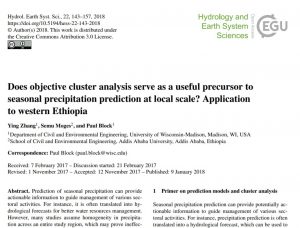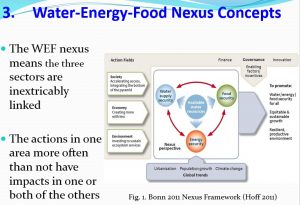 Ying Zhang, PhD student at University of Wisconsin (now a postdoc at John Hopkins University), Dr. Semu Moges and Dr. Paul Block, have recently published a journal paper on objective cluster analysis and its usefulness as a precursor to seasonal precipitation prediction at local scale with an application at western Ethiopia.
Ying Zhang, PhD student at University of Wisconsin (now a postdoc at John Hopkins University), Dr. Semu Moges and Dr. Paul Block, have recently published a journal paper on objective cluster analysis and its usefulness as a precursor to seasonal precipitation prediction at local scale with an application at western Ethiopia.
The study proposes advancing local-level seasonal precipitation predictions by first conditioning on regional-level predictions, as defined through objective cluster analysis, for western Ethiopia. To the authors knowledge, this is the first study predicting seasonal precipitation at high resolution in this region, where lives and livelihoods are vulnerable to precipitation variability given the high reliance on rain-fed agriculture and limited water resources infrastructure. The combination of objective cluster analysis, spatially high-resolution prediction of seasonal precipitation, and a modeling structure spanning statistical and dynamical approaches makes clear advances in prediction skill and resolution, as compared with previous studies.
Zhang Y., Moges S., and Block P. (2018) Does objective cluster analysis serve as a useful precursor to seasonal precipitation prediction at local scale? Application to western Ethiopia, Hydrology and Earth System Sciences, 22, 143-157, doi.org/10.5194/hess-22-143-2018
 The aim of the research presented at the seminar is to develop a comprehensive water-energy-food (WEF) nexus modeling framework for evaluating the current and emerging national development plans in Ethiopia and provide alternative sustainable development pathways through scenario analysis and taking Ethiopia as a case study. Ethiopian Growth and Transformation Plan II (GTP II), national vision 2025 of achieving middle income country status by 2025 and various other energy and food development plans are considered. Preliminary results indicate economic development represented by energy consumption per capita to the planned level of middle income country by 2025 has significant impact on other resources development and utilization than population growth, urbanization and climate change combined. The results also indicate the limits of planned hydropower energy export to neighboring countries, agricultural land expansion limits and preferred crop production. The study is ongoing and it used to demonstrate the power of scientific tools such as water-energy-food modeling for quantitative understanding of sustainability.
The aim of the research presented at the seminar is to develop a comprehensive water-energy-food (WEF) nexus modeling framework for evaluating the current and emerging national development plans in Ethiopia and provide alternative sustainable development pathways through scenario analysis and taking Ethiopia as a case study. Ethiopian Growth and Transformation Plan II (GTP II), national vision 2025 of achieving middle income country status by 2025 and various other energy and food development plans are considered. Preliminary results indicate economic development represented by energy consumption per capita to the planned level of middle income country by 2025 has significant impact on other resources development and utilization than population growth, urbanization and climate change combined. The results also indicate the limits of planned hydropower energy export to neighboring countries, agricultural land expansion limits and preferred crop production. The study is ongoing and it used to demonstrate the power of scientific tools such as water-energy-food modeling for quantitative understanding of sustainability.